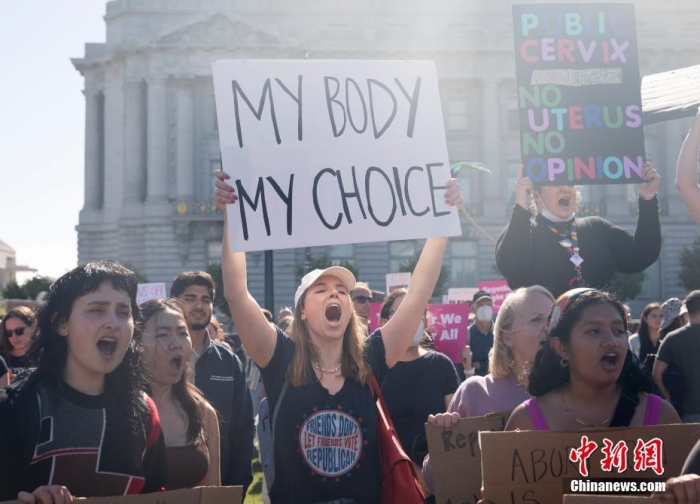China News Service, July 3. Comprehensive foreign media reports that a 10-year-old girl in Ohio was denied an abortion in the state after the U.S. Supreme Court overturned the "Roe v. Wade case".
It is also one of the latest cases in which a Supreme Court decision has had a substantial impact.
On June 24, local time, people in San Francisco gathered in front of City Hall to protest against the Supreme Court's overturn of Roe v. Wade.
Photo by China News Agency reporter Liu Guanguan
Girl, 10, seeks 'interstate abortion'
An Ohio doctor reportedly treated a 10-year-old patient who was six weeks and three days pregnant.
Doctors will not be able to abort her as the state's abortion ban took effect quickly after the U.S. Supreme Court issued a ruling.
Currently, the 10-year-old girl is traveling to the neighboring state of Indiana to seek an "interstate abortion."
Under Ohio's abortion ban, abortion is prohibited after fetal heart activity has been detected (approximately 6 weeks gestation).
In Indiana, abortion is still legal within 22 weeks of pregnancy.
Federal government will protect women seeking abortion
On June 24, local time, the U.S. Supreme Court issued a ruling that formally overturned the Roe v. Wade case and ended the constitutional protection of the right to abortion.
Afterwards, protests broke out in many parts of the United States.
U.S. President Joe Biden also made a speech, calling the Supreme Court's ruling a "tragic mistake" that set America back 150 years.
On July 1, local time, Biden held a meeting with 10 Democratic governors, saying that the federal government will do its best to protect women who want to seek abortion drugs in states that prohibit abortion, or who need to go to other states to have an abortion.
Biden said he supports Congress' vote to write Roe v. Wade into law, but there aren't enough Democrats in the Senate willing to suspend the filibuster's "long debate" rule to help the bill come into existence.
Biden is calling on all Americans to vote for pro-choice candidates in the midterm elections.
On June 24, local time, people in San Francisco gathered in front of City Hall to protest against the Supreme Court's overturn of Roe v. Wade.
Photo by China News Agency reporter Liu Guanguan
or trigger a judicial melee
After the U.S. Supreme Court overturned the Roe v. Wade case, states have also reacted very differently.
Some states have already started the process of launching laws banning abortion.
In some of these states, abortion laws can go into effect directly, while in others, they require a signature by state officials or can take effect after a certain period of time.
The New York Times and the Associated Press pointed out in their reports that after the U.S. Supreme Court overturned the "Roe v. Wade" case, it handed over the power to formulate abortion regulations to states, which may cause judicial melee.
On June 28, local time, a Texas court temporarily blocked the reinstatement of the abortion ban, and abortions within six weeks of pregnancy can still be performed in Texas.
However, on July 2, local time, medical clinics in Texas stopped providing abortion services, because the state Supreme Court ruled on the 1st to cancel a decree that would resume abortion services for pregnant women six weeks or less pregnant.
The ban will be enforced civilly rather than criminally.
American Civil Rights Union lawyers representing abortion clinics vowed to keep fighting.
They said lower court judges could block again after arguments on July 12.
In New York state, abortion and contraceptive rights were ratified in the state constitution on July 1.
New York state law already allows abortion, a move that would add additional legal protections.

